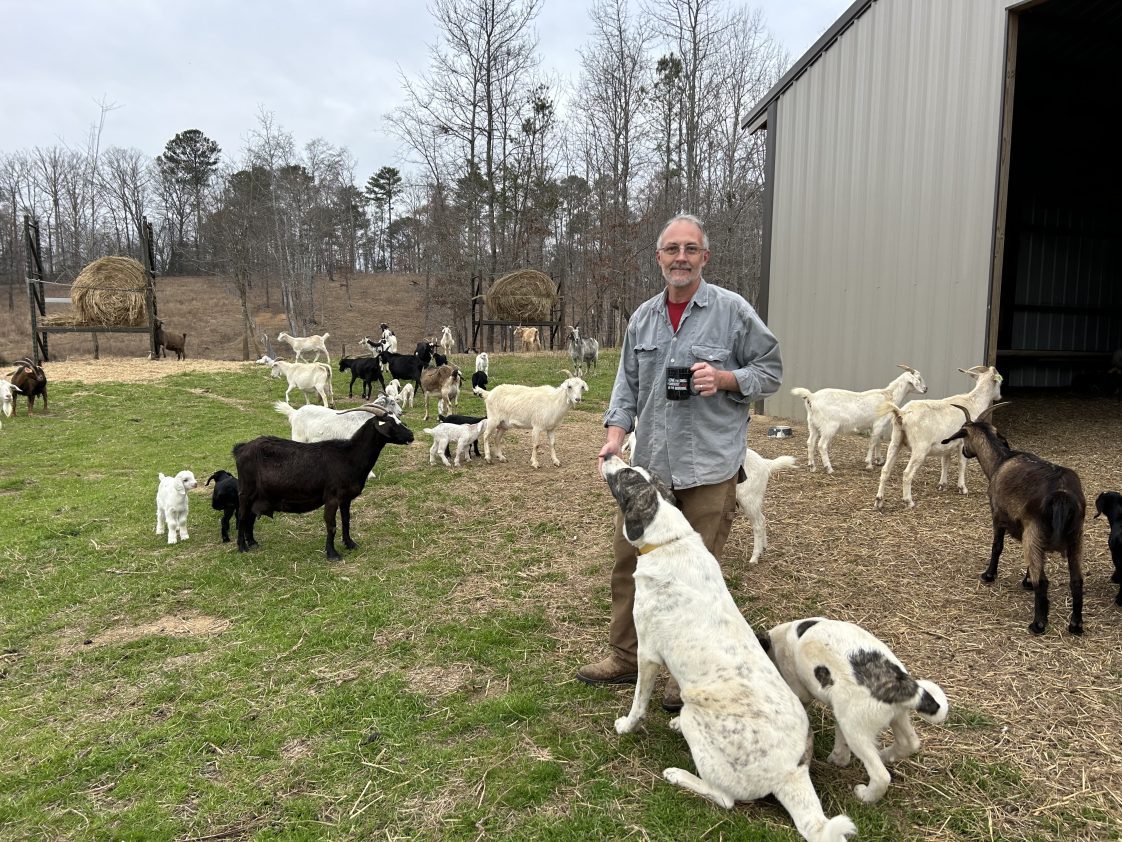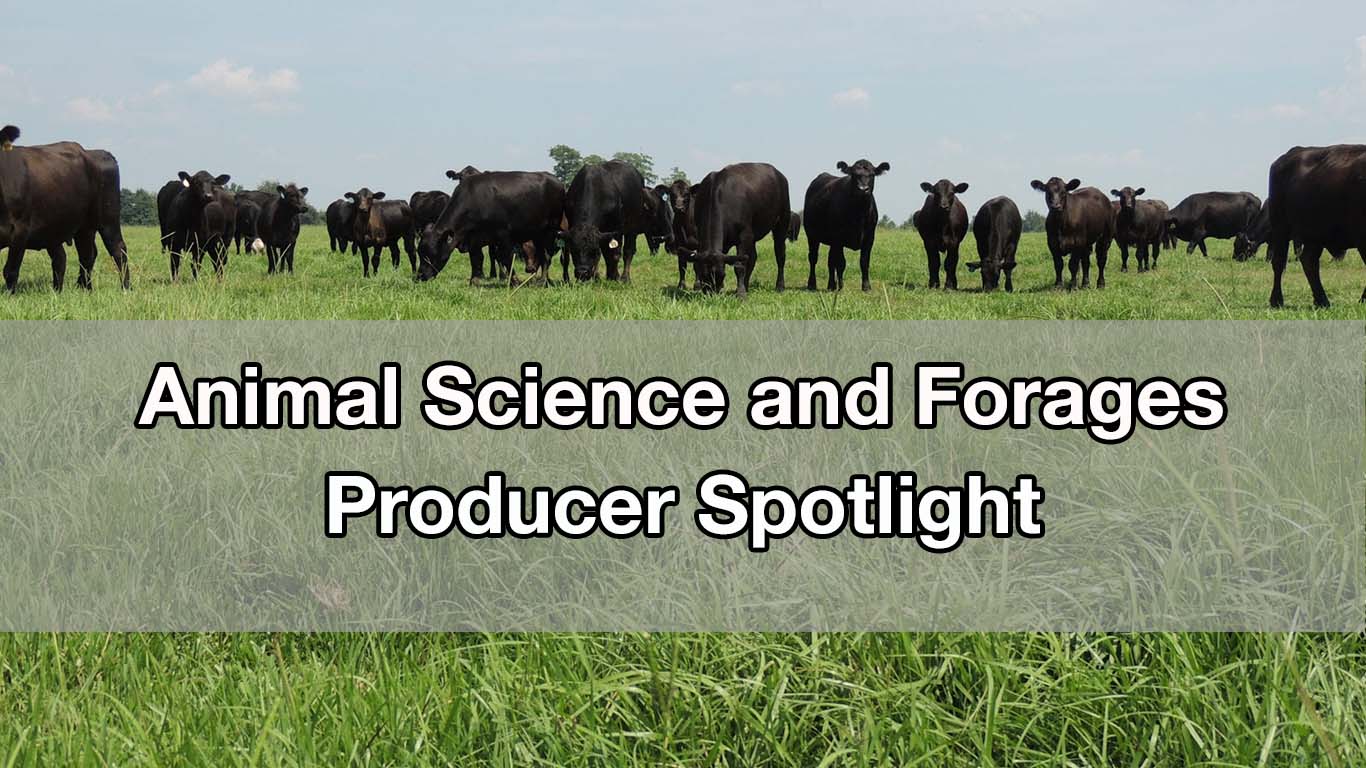Beef

The Alabama Cooperative Extension System’s animal sciences and forages team is proud to highlight livestock and forages producers that have made great contributions to the industry. The team hopes to impart wisdom from seasoned producers to benefit and encourage new producers, as well as established producers.
Jeff Lamote

Jeff Lamote
Jeff Lamote grew up on a farm in southwest Minnesota, so you could say that farming is in his blood. After high school, Lamote was in the military for 9 years. He served as an instructor and was part of the Naval Nuclear Propulsion Program, where he performed chemistry and radiological controls on a submarine. After the military, Lamote went to work in logistics for the North American grain division of Cargill. In this role, he shipped products across the country and traveled a lot. This brought him to Alabama in 2003, where he originally bought goats to clear his land and help with drainage around his house. He chose Kiko goats and eventually grew into the business.
Lamote met his wife in 2003, and they have two daughters. He wanted to expand the farm to raise his daughters on a farm. The family has been raising Kiko goats in Cullman, Alabama for the last 14 years. The family’s farm has 45 Kiko goats, and they have been doing performance testing since 2017. Lamote sends young bucks to a performance test evaluation center to compare them to the industry standard. Lamote’s operation has had high rankings in those national tests over the years. In 2023, Lamote and five other producers served on a steering committee to start a Southeast performance test at Mississippi State University. Also in 2023, Lamote acquired a small dairy and is expanding the operation to include dairy goats. It will be a dairy operation inspected by the United States Department of Agriculture (USDA) to make goat cheese and butter. It is planned for the dairy to be up and running at in a few months. At the end of the day, Lamote and his family want to be self-reliant and produce something that is of value to others.
What are a few of the main production goals of your farming operation?
My future farming goals are to continue to improve the survivability and profitability of the Kiko meat goat through performance testing and strict selection. I don’t have enough land to have a big commercial operation. If I did, I would raise Kiko meat goats commercially for slaughter, because that is their purpose as a meat goat. So, my focus is to provide quality genetics of Kiko goats that can survive the Southeast for other producers.
Are there any aspects of your operation that make it unique, when compared to other operation?
I would say focusing on the low-input costs of my operation is something unique. We focus on the selection of livestock that are low input and pesticide resistant. So, my goats may be slightly smaller than some of the registered goats you see at national sales, but it is because I want to raise goats that are easy to maintain, do not require large feeding inputs, and are resistant to parasites.
What challenges have you faced in your production operation?
Even though the United States imports more than half the goat meat we consume, it is still a niche market. The consumer base is a lot of ethnic consumers, and there is not a big demand for that in the local market. So, we drive to Tennessee for the USDA’s graded sale, and the goats bring twice as much there than they do at local sale barns in Alabama. We work with local farmers to make the tips to Columbia, Tennessee. So, I would say the long-distance travel to market my animals is a challenge. Of course, the rise in prices of inputs, such as cotton seed and hay, to supplement my herd have been a slight challenge as well.
How has the Alabama Extension animal sciences and forage team helped you meet your goals and address these challenges?
I have talked to the team about fall seeding to establish some winter grazing, and they also participated in the national registry sale, which was in Cullman last year. The team was helpful in educating local people in the seminars, and they also located pens for us to have at the sale. They have also had good workshops on controlling parasites that I have been able to participate in. I have also used the Extension office’s hay probe to test my hay, so I was able to determine what I would need to supplement my goats with. Extension has also asked me to help teach some workshops for goats, so it has been a great relationship for both sides.
What is one of your favorite aspects of being involved in livestock and forage production?
Kidding season is better than Christmas for my daughters and me! There is nothing cuter on Earth than a baby goat. It is very fulfilling to see the fruits of your labor over time. I rarely have to deworm any of my goats, and it is because I have refined my genetics and selected for pesticide-resistance and high-quality animals.
If you could share one thing you’ve learned about raising livestock and forages over the years with other producers, what would it be?
Among goat people, I would say to learn the FAMACHA chart and use that as your tool for medicating goats. Never deworm a goat that does not need it, and 90 percent of a goat’s health, if not more, is based on that FAMACHA chart. So, many producers do monthly deworming or they feed too much, and that masks weaknesses in a goat. Be smart about your inputs for both costs and selection. If you watch your inputs, you are better able to see which animals in your herd perform better and will pass down higher-quality genetics without having to over feed and over medicate.

